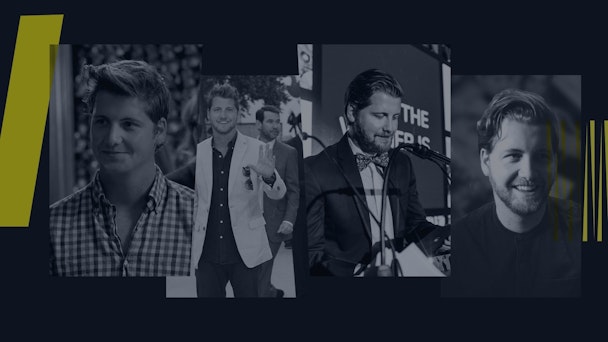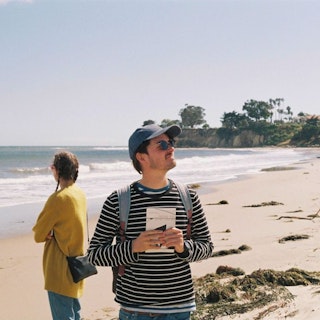The influencer marketing leader who was made in Chelsea
Stevie Johnson is managing director at influencer marketing agency Disrupt, part of the Tomorrow group alongside shops including Found. Johnson has a unique perspective on influence and celebrity, having been a cast member of behemoth British ‘constructed reality’ show Made in Chelsea at its Bafta-winning peak. We sat down with him to talk about changing sides and the influence of influencing.

Made in Chelsea’s Stevie Johnson is now managing director of marketing agency Disrupt / Image courtesy of Disrupt
Hey Stevie! What does your job at Disrupt consist of?
I’ve been part of the influencer marketing landscape since its inception, since back when it was more of a wild west. I’ve worked for agencies on big-name global brands such as Puma, Disney, Bose and Samsung. That led me to where I am at Disrupt now: a full-service influencer marketing agency.
Disrupt was initially a youth marketing agency; it was acquired by Found back in 2018. In 2020, they were looking at revamping it to step into the present day. That’s when I came in as managing director.
And you were once on a TV show...
Yeah, once upon a time. I joined Made in Chelsea in 2012. It had been running for a year and I was a year out of university. I’d been approached when I was finishing university. The show was quite popular but didn’t have the best reputation: a bunch of young posh kids, running around doing whatever. I was quite against doing it. I was finishing university and keen to get into work.
I worked for a year, initially at a boutique marketing agency, then in finance, doing wealth management. A year on I got another approach. I’d been working for a year and I was like, “I’m 23, I’m not ready to be settled down with work stuff.”
I joined with one of my best friends, and ended up doing it for three years from 2012 to 2015, seven series.
Did you have to ditch the job?
They’re supportive of your work schedule; they’re quite keen for people to work for that reality angle. But once you’re involved in the show, you’ve kind of sold yourself to them. You need to be available for specific filming days and you might only get the call the day before. It’s difficult to hold down full-time employment – I can’t go to my line manager and say, “by the way, I’m not going to be in until lunchtime tomorrow.”
My line manager was incredibly supportive, but the consensus was I had to choose. I made the choice to go and do the show.
Do you get paid for the show?
You have a daily filming rate. The more you film, the more you get paid. And you work through tiers, depending on how long you’ve been on the show and your popularity.
I didn’t film a huge amount of my first year; I was a bit too shy. I wasn’t fully giving myself to the show. But by the time I was three years in, I was filming multiple times a week, I was on a good rate and I was getting other sponsorship deals from outside the show.
If it’s all about how much you film, did it get dog-eat-dog about who can give them the juiciest storylines?
Definitely. Ultimately, you’ve got to give yourself and your life to the show. If I was more open to dating on camera, or making snide comments about other people, or getting into difficult situations, then that’s more entertaining for the audience. No one wants the guy that’s a bit plain. That’s not going to draw in viewers.
I was fortunate that I was generally perceived as a ‘nice guy,’ which for the first year didn’t do me justice, because I wasn’t giving up much information. But over time they saw the value in having me as opposed to some of the more alpha males or the bad boys to be more of a voice of reason. I found my niche, which has held me in good stead as I’ve gone back into work.
Speaking of which, why did you leave?
After three years, I came to the realization that there was no longevity for me in continuing to do reality TV. I’d had a good spin for three years, I was filming loads, I got everything out of it that I wanted.
But did I want to wake up at the age of 30 still doing this? I decided to go back into the industry and build a career. You start missing routine as well – you’ve got to be in, say, Wolverhampton on a Tuesday night to do a club appearance. It gets a little bit more soulless.
When you rejoined the marketing world, what new knowledge about influence and celebrity did you bring with you?
When I left the show, I was at a crossroads. I couldn’t go back into finance. And I was like, “what skills have I learned?”
Well, social had blown up overnight. I got up to half a million followers on Instagram (I don’t quite have that many anymore) and I’d started working with brands as an influencer. I knew how influencers could connect with brands and I knew what I wanted from a brand relationship and what would work for me. That became valuable for companies tapping into the influencer space.
I initially worked for an app, Brandbassador, that was trying to get ambassadors to promote products for brands, looking after the talent side of it. After a year, I joined a US-based influencer marketing agency called Open Influence, to look after the talent relationships, as well as doing some client service stuff.
When I joined Disrupt, I think the ‘influencing from the inside’ message that I push based on my background as an influencer really attracted them. I knew the space, I had good relationships with brands, and I had the influencer mindset.
Are you still doing any influencing yourself?
I do very little now. I know that there’s very little benefit for a brand to tap into me now. I still have a big audience, but it’s more than just looking at who’s got a huge number of followers these days. It’s all about understanding who that audience is, what their interests are, what those demographics are and so on, and utilizing that to pair people with brands.
I’ve got this big following, but I don’t share a lot about my life; I haven’t been on TV for six years; people don’t really resonate with me as much. I also don’t have the ability to create content the way that people can do now, with short-form snappy videos. I still know the influencers who can do that, but if a brand came to me, I would want to work with them to spend their money better elsewhere, working with other influences.
That goes the other way too, right?
Yes! This has changed a lot over the last few years; influencers won’t just partner themselves with any brand anymore. Back in the day, a brand could throw money under an influencer’s nose and they would go and promote it.
Nowadays, influencers have built up their audience from scratch; they’ve got a really engaged fanbase that hangs on their every word, and they don’t want to alienate their audience based on who they’re partnering with. Influencers are turning down deals because it’s not going to resonate with their audience. Audience is king to them. There needs to be that shared ethos between brand and talent.
Would you ever go back on a TV show? Big Brother’s coming back, how about that?
No, I think I’m settled in my career; I’m married with a child. If there was a show around my day-to-day life or within the industry, I’d be open to that. But traditional reality TV? I’m too old. I’m not as interesting as I used to be.
Content created with:

Found.
WE ARE FOUND.
WE HELP BRANDS GET FOUND ONLINE.
We’re the digital performance experts who devise and deliver more opportunities for brands to...

